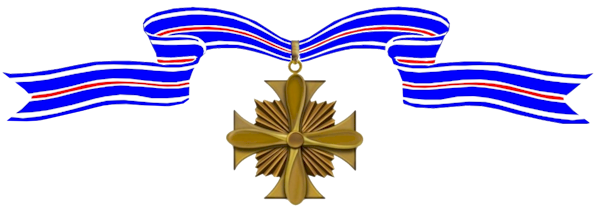Paul Douglas became a World War II ACE and finished the war with a total of EIGHT aerial victories. He flew a total of 136 combat missions and 337 combat hours while serving as commander of the 396th Fighter Squadron, vice commander of the 368th Fighter Group, and later as commander of the 36th Fighter Group in Belgium, France and Germany. In January 1968 he went to Korat Royal Thai Air Force Base, Thailand, as commander of the 388th Tactical Fighter Wing, flying F-105 Thunderchiefs on combat missions over North Vietnam. He retired in 1970 as a Brigadier General.

–
Cemetery:
Awards Received
-

Legion of Merit
-

Silver Star
-

Silver Star
-

Legion of Merit
-

Distinguished Service Cross
-

Distinguished Service Cross
-

Silver Star
-
Legion of Merit
Service:
United States Air ForceRank:
ColonelAction Date:
July 20, 1965 – January 15, 1968
Department of the Air Force, Special Order GB-219 (May 21, 1968)The President of the United States of America, authorized by Act of Congress, 20 July 1942, takes pleasure in presenting a Bronze Oak Leaf Cluster in lieu of a Second Award of the Legion of Merit to Colonel Paul Page Douglas, Jr. (AFSN: FR-8073/ASN: 0-432187), United States Air Force, for exceptionally meritorious conduct in the performance of outstanding services to the Government of the United States as Commander, 41st Air Division, Yokota Air Base, Japan, from 20 July 1965 to 15 January 1968. During this period, the exemplary ability, diligence, and devotion to duty of Colonel Douglas were instrumental factors in the resolution of many complex problems of major importance to the Air Force. The singularly distinctive accomplishments of Colonel Douglas reflect great credit upon himself and the United States Air Force.
-
Silver Star
Service:
United States Army Air ForcesRank:
Lieutenant Colonel (Air Corps)Batallion:
396th Fighter SquadronRegiment:
368th Fighter GroupDivision:
9th Air ForceAction Date:
April 13, 1945
Headquarters, 9th Air Force, General Orders No. 126 (July 6, 1945)The President of the United States of America, authorized by Act of Congress July 9, 1918, takes pleasure in presenting a Bronze Oak Leaf Cluster in lieu of a Second Award of the Silver Star to Lieutenant Colonel (Air Corps) Paul Page Douglas, Jr. (AFSN: FR-8073/ASN: 0-432187), United States Army Air Forces, for gallantry in action while serving with the 396th Bombardment Squadron, 368th Fighter Group, NINTH Air Force on 13 April 1945. Lieutenant Colonel Douglas distinguished himself by superior aerial proficiency and leadership while participating in aerial flight against the enemy in the vicinity of Jutebeg and Damm, Germany. Despite heavy haze Lieutenant Colonel Douglas led repeated attacks on two enemy airfields in the face of concentrated enemy fire at both landing grounds. The unusual courage and technical efficiency displayed by him resulted in a great blow to the enemy air forces. He personally destroyed seven aircraft and damaged another while under his brilliant direction, 16 were destroyed by his squadron and an additional four were severely damaged. The excellent combat record achieved by Lieutenant Colonel Douglas on this occasion reflects the highest distinction to himself and the Army Air Forces.
-
Silver Star
Service:
United States Army Air ForcesRank:
Lieutenant Colonel (Air Corps)Batallion:
396th Fighter SquadronRegiment:
368th Fighter GroupDivision:
9th Air ForceAction Date:
April 12, 1945
Headquarters, 9th Air Force, General Orders No. 134 (July 16, 1945)The President of the United States of America, authorized by Act of Congress July 9, 1918, takes pleasure in presenting a Second Bronze Oak Leaf Cluster in lieu of a Third Award of the Silver Star to Lieutenant Colonel (Air Corps) Paul Page Douglas, Jr. (AFSN: FR-8073/ASN: 0-432187), United States Army Air Forces, for gallantry in action while serving with the 396th Fighter Squadron 368th Fighter Group, NINTH Air Force on 12 April 1945. Despite navigational difficulties presented by adverse weather conditions, Lieutenant Colonel Douglas, while launching an assault against enemy airfields in the vicinity of Leipzig, Germany, distinguished himself by outstanding courage and brilliant leadership. Although his own aircraft sustained severe damage from intense anti-aircraft fire, he determinedly held his position in flight and directed attacks upon two airdromes, destroying seventeen of the seventy-three planes accountable to his squadron. During the course of his daring attacks, Lieutenant Colonel Douglas silenced numerous gun positions, enabling his squadron to continue their mission unimpeded. The superior airmanship and heroic devotion to duty displayed by Lieutenant Colonel Douglas on this occasion reflect great credit upon himself and are in keeping with the highest traditions of the Army Air Forces.
-
Legion of Merit
Service:
United States Air ForceRank:
ColonelAction Date:
August 8, 1955 – November 30, 1957
The President of the United States of America, authorized by Act of Congress, 20 July 1942, takes pleasure in presenting the Legion of Merit to Colonel Paul Page Douglas, Jr. (AFSN: FR-8073/ASN: 0-432187), United States Air Force, for exceptionally meritorious conduct in the performance of outstanding services to the Government of the United States as Chief, Investigation and Field Operations Division, Directorate of Flight Safety Research, Office of the Inspector General, Norton Air Force Base, California, from 8 August 1955 to 30 November 1957. During this period, Colonel Douglas developed procedures which will further reduce an already low rate of aircraft accidents. As a result of his efforts, various programs were initiated which materially assisted Air Force units in their conversion to new and different type aircraft. Colonel Douglas’ modifications and application of the concept of operations safety services have provided commanders a method to analyze all factors affecting the safe and effective accomplishment of their assigned mission. Colonel Douglas displayed outstanding initiative and ability in establishing the Annual World Wide Flying Safety Officers Conference which has resulted in an Air Force wide identification of critical operational deficiencies and unified actions to achieve prompt remedial action. Through his high sense of responsibility and selfless devotion to duty, Colonel Douglas has reflected great credit upon himself and the United States Air Force.
-
Distinguished Service Cross
Service:
United States Army Air ForcesRank:
Lieutenant Colonel (Air Corps)Batallion:
396th Fighter SquadronRegiment:
368th Fighter GroupDivision:
9th Air ForceAction Date:
October 20, 1944
Headquarters, U.S. Strategic Forces in Europe, General Orders No. 13 (February 4, 1945)The President of the United States of America, authorized by Act of Congress, July 9, 1918, takes pleasure in presenting the Distinguished Service Cross to Lieutenant Colonel (Air Corps) Paul Page Douglas, Jr. (AFSN: FR-8073/ASN: 0-432187), United States Army Air Forces, for extraordinary heroism in connection with military operations against an armed enemy while serving as Pilot of a P-47 Fighter Airplane in the 396th Fighter Squadron, 368th Fighter Group, NINTH Air Force, in aerial combat against enemy forces on 20 October 1944, in the European Theater of Operations. On this date, Lieutenant Colonel Douglas was returning to base as leader of a squadron of fighter aircraft with his supply of gasoline almost exhausted, when a formation of more than 20 enemy aircraft carrying bombs was observed. Completely disregarding the odds against him, he ordered all but five of his aircraft to return to base, and with this small number unhesitatingly attacked the enemy formation with such ferocity that they were forced to jettison their bombs directly over the city of Coblenz and take evasive action. In the ensuing combat, Lieutenant Colonel Douglas relentlessly pursued the enemy, destroyed three of his aircraft and damaged a fourth. His own plane was continually under attack and sustained many hits. He was painfully wounded and his airplane’s right wing was set on fire, yet he managed to return to base. The extraordinary heroism and zealous devotion to duty displayed by Lieutenant Colonel Douglas on this occasion are in keeping with the highest traditions of the Armed Forces and reflect great credit upon himself, the 9th Air Force, and the United States Army Air Forces.
-
Distinguished Service Cross
Service:
United States Army Air ForcesRank:
Lieutenant Colonel (Air Corps)Batallion:
396th Fighter SquadronRegiment:
368th Fighter GroupDivision:
9th Air ForceAction Date:
March 14, 1945
Headquarters, U.S. Strategic Forces in Europe, General Orders No. 69 (June 14, 1945)The President of the United States of America, authorized by Act of Congress July 9, 1918, takes pleasure in presenting a Bronze Oak Leaf Cluster in lieu of a Second Award of the Distinguished Service Cross to Lieutenant Colonel (Air Corps) Paul Page Douglas, Jr. (AFSN: FR-8073/ASN: 0-432187), United States Army Air Forces, for extraordinary heroism in connection with military operations against an armed enemy while serving as Pilot of a P-47 Fighter Airplane in the 396th Fighter Squadron, 368th Fighter Group, NINTH Air Force, in aerial combat against enemy forces on 14 March 1945. On this date, with only three aircraft supporting him, Colonel Douglas attacked a force of more than fifty enemy aircraft carrying bombs toward the American lines in the Remagen Bridgehead. Completely disregarding the enemy’s overwhelming numerical superiority, he attacked relentlessly, compelling the hostile aircraft to jettison their bombs. In the ensuing combat Colonel Douglas destroyed three enemy planes while the aircraft he was leading destroyed seven additional enemy planes with no loss to themselves. The extraordinary heroism and determination of this officer to destroy the enemy are in keeping with the highest traditions of the Armed Forces of the United States.
-
Silver Star
Service:
United States Army Air ForcesRank:
Lieutenant Colonel (Air Corps)Batallion:
396th Fighter SquadronRegiment:
368th Fighter GroupDivision:
9th Air ForceAction Date:
October 6, 1944
Headquarters, 9th Air Force, General Orders No. 289 (December 10, 1944)The President of the United States of America, authorized by Act of Congress July 9, 1918, takes pleasure in presenting the Silver Star to Lieutenant Colonel (Air Corps) Paul Page Douglas, Jr. (AFSN: FR-8073/ASN: 0-432187), United States Army Air Forces, for conspicuous gallantry in action against the enemy while serving with the 396th Fighter Squadron, 368th Fighter Group, NINTH Air Force in the European Theater of Operations, on 6 October 1955. Lieutenant Colonel Douglas demonstrated outstanding leadership on a group attack on a large number of hostile planes camouflaged in a field near Cologne, Germany. Despite intense, accurate anti-aircraft fire he skillfully directed his men to the attack, and although his own aircraft sustained serious battle damage he accounted personally for the destruction of six of the grounded aircraft. Lieutenant Colonel Douglas’ calm judgment and spirited leadership on this occasion are in keeping with the highest traditions of the Armed Forces of the United States.


